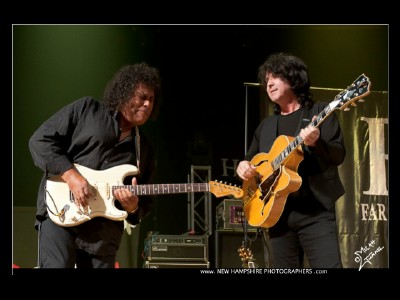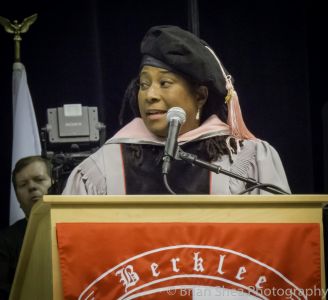FBI and The Future of Music.
Interview by Bluebird.
Photos by Micah Gummel.
Album art courtesy of FMan Media 2011.
Many thanks to Charlie Farren, Jon Butcher and the Colonial Theatre, Keene, NH.
 I had the true privilege to interview Jon Butcher and Charlie Farren at the Colonial Theatre in Keene, NH. Each are talented artists, writers and musicians, with extensive recording histories. They are currently embarking on new media projects that circle and encompass the vast fields of musical styles.
I had the true privilege to interview Jon Butcher and Charlie Farren at the Colonial Theatre in Keene, NH. Each are talented artists, writers and musicians, with extensive recording histories. They are currently embarking on new media projects that circle and encompass the vast fields of musical styles.
Click on the thumbnail photo to the right for the new FBI website so you can listen to FBI radio with us !
Jon Butcher and Charlie Farren: Real Music, True Musicians.
Listen to Fool In Love by Charlie Farren, he still plays it live. For Charlie Farren's website click here.
The Interview:
New projects from Farren-Butcher-Incorporated (FBI).
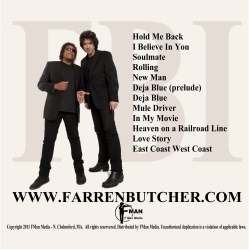
The record from Charlie Farren and Jon Butcher is cleverly called FBI (Farren Butcher Incorporated). Their collective excitement about it lit up the room as we talked about it tonight. There is new material on it, but this dynamic duo say they are not stopping with the record.
From The Colonial Theatre, Keene, NH December 9th, 2011.
Charlie: Nowadays, it is more than just making records and doing shows. We are thinking outside the box, and have a lot other plates spinning at the moment.
Jon: In some ways records are less important than they've ever been.
Charlie: - as sources of income, [they are still] real important as expressions of art.
Jon: - but as sources of income, they are less important than they've ever been. They are more promotional now.
Charlie: The records are kind of like the poster you used to put up for the show.
Bluebirdreviews: What an interesting way to look at this !
Jon: It is though ! And in terms of strict detail, record sales for all artists across all genres is down, because there are more downloads than there ever have been before - that being said - the records that you make as an artist, the roles for them have changed, instead of it being a prime mover for retail sales, they are promotional. They act as a conduit to touring and to other sources of income that is tangible, instead of just record sales, would you agree ?
Charlie: It is 'a' source of income, you used to make a record and then you'd tour behind the record and the record company would organize that. You'd tour behind the record and that would be your career. Now there is no record company, for the most part, you have to be your own record company, you have to be entrepreneurial about it. The record is a piece of it, but it isn't all of it, neither is touring. So we're trying to discover and invent ways to build a platform that will offer our music to a broader audience. And we're doing some things that you'll hear about soon.
Bluebirdreviews: So are these things top secret right now ?
Charlie: How top secret are they ?
Jon: We can talk about it in broad terms, I think.
Charlie: We're developing what will be an inter-net based and radio based discussion of topics related to gear.
Jon: Guitars, amps, touring, making videos, making records ...
Charlie: ... stories from the road ...
Bluebirdreviews: That's great.
Charlie: .... how my band is always, a little bit better than his band ...
(laughs)
Jon: ... how I taught him everything he knows ... on the guitar ...
(laughs)
A Legendary Friendship and Combined Talents Make for a Great Foundation in Music and Media: FBI
Bluebirdreviews: You know, I read a lot of press about you guys, so much of it is about your relationship and friendship. It's just great! It's this legendary friendship that you've had for such a long time.
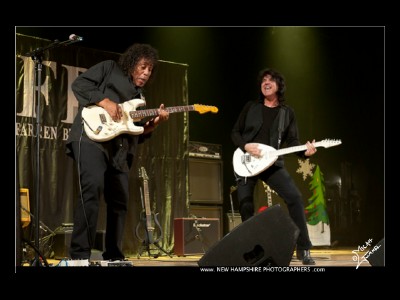
Jon: We've been friendly competitors for years, that turned into a friendship over the years. I would go see his band play locally, then me and my boys would stand back, cross our arms and go ... he's not that good ... (laughs)
Charlie: ... and even more recently ... I release a record every year, and I would send him a track, then he'd play some guitar [for it] in California and send it back. Then I'd mix it into the track. So we've been doing that for a long time.
Jon: And that kind of interaction forms the basis of our new project, really. The fact that we've been long time mates, buddies also competitors at one time, and now are allies, really forms the solid foundation for our friendship and for our new project. We're excited about it, and if I seem to be skirting it a little bit, it's because our launch time is soon and I want to make sure we don't blow it !
Bluebirdreviews: Well, talk about FBI. I love the album ! And I love it because I can tell by listening to it, the experience that each of you have, in blues and rock ... even soul. Yet it crosses forms.
Jon: It does ! I had left New England for a number of years to pursue another career in film and TV music. Then I moved back. Charlie and I were talking all the while. Our first initial encounters, musically speaking were, you know, not that prolific, but we had a sense of what it could be. So it wasn't that we had all the material written necessarily, or knew what the songs would be, but we had a sense of what the potential was and I think when we did the record, that hope was exceeded by what actually turned out. The record turned out great! I'm really proud of it all. Of course, he (Charlie) is a tremendous singer and writer. And speaking as a guitar player, it's really an experience to work with him, in earnest.
Charlie: It's deliberately broad. We deliberately wanted a broad scope. And the fun thing is that tonight we are performing as a duo, for a 45 minute set. When we perform as a duo and we do a full show, we have a whole set of tunes that we don't perform when we play with the band. We can perform as a band without doing any of those songs and play all hits that most people know. We have so much material we could each do a solo show as well, drawing from all of our records. We have a lot of material. So we wanted to make this record, deliberately broad, so that we can do a lot of different things with it. We've played as a trio, where one of us plays bass and drums. We've played with a four piece and five piece format. Played different songs from our record and our catalog.
Bluebirdreviews: There is a little bit of cross over from the other albums to the new one.
Jon: Definitely. And you know what, and we've talked about this, an album isn't what it used to be. When artists made records and LP's it was sort of a symmetry of thoughts and ideas and concepts. And now with the inter-net, people download songs, they are away from the concept of the album as it was and more than ever, individual songs matter to people.
Charlie: And they make their own record. They make their own play-lists.
Jon: That's what I was going to say.
Charlie: So we thought, this offers us an opportunity to appeal to a lot of different audiences.
Jon: Right. It's broad and maybe in the old days it might not have been conceptually consistent, but from the vantage point of the 21st century, it's good to have that kind of broad spectrum to your music, it allows for a lot more of opportunity.
Charlie: [Yes,] a lot more opportunity!
Bluebirdreviews: Did you produce the record yourself?
Charlie: Yes.
Bluebirdreviews: Wow, I heard it and I thought, if Quincy Jones was going to produce a couple of rock legends, it would sound like this [record].
Jon: Cool !
Bluebirdreviews: The way he puts albums together. I'm still old fashioned, I buy an album and I listen to it ...
Jon: Yeah, well so do we ...
Bluebirdreviews: I read the ...
Jon: ... liner notes ...!
(both laugh)
Bluebirdreviews: liner notes ! ... and all of that. With your album, it's the way that it's put together, the order of things.
Jon: Well Charlie's got a great digital studio in his home ...
Charlie: We call it the FMansion ... The Company is FManMedia. So we call it the FMansion. It's not a mansion, it's just a funny name.
(laughs)
Jon: Well, it's kind of a mansion, but we won't get into that ... the studio is a great resource and a way for us to try out a lot of stuff out.
Charlie: It's a man cave ! With gear in it ... all in the studio.
The Silent Guitar
Photographer Micah Gummel (New Hampshire Photographers) has covered Charlie Farren and Jon Butcher's live shows extensively. He knows their work and sent in two questions for the interview:
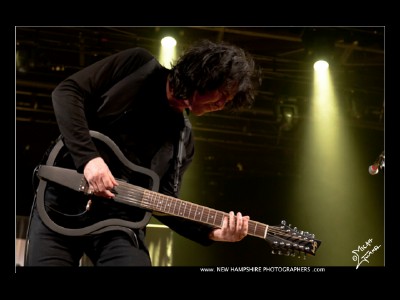
MG/NHP: (via email) One cool thing to talk with Charlie about is his crazy "body-less guitar" that he is proud of.
Charlie: My body-less guitar ...
Jon: The twelve string.
Charlie: It just got one of its horns knocked off ... in transit to the show here...
Jon: I'm sorry to hear that. Tell the story about the guitar.
Charlie: I had a twelve string guitar, it wasn't a very expensive one, but it was pretty good, it was a Yamaha and it broke. The truss rod snapped on it (disconnected). We do one song with the twelve string, but it's a centerpiece song, called Mule Driver.
Bluebirdreviews: Love that song !
Charlie: Yeah, it's awesome.
Jon: We're gonna do that tonight.
Bluebirdreviews: That is a great blues song !
Charlie: I wanted to get another guitar instead of getting that one fixed, because it's an expensive repair. I saw this one and it's just the shape of a guitar. The outline of a guitar.
Jon: There's no body.
Charlie: They refer to them as silent guitars, because they don't really have a body. It was made in China and it was 135 dollars.
Jon: Cheap !
Charlie: I thought, it looked cool, maybe I can make it sound good. So I got it and I plugged it in, but it wasn't playable. I had to have a friend, Wolf Ginandes, from Boston, and also a bass player, [try to fix it.] I brought it to him and said make this playable and he worked his magic on it. And now, you know, I've had two and three thousand dollar twelve string guitars, yet this is the best twelve string guitar I have ever owned.
Jon: Now I'm going to add to this, Charlie has designed and manufactured what's called, The FMAN guitar, which is a solid body electric guitar that he is very proud of. And he made the prototype in his basement out of this part, that discarded plank of wood, and whatever. You [will] see it up on stage tonight. It is this guitar that he designed and now it is manufactured by Campbell American Guitars, He is one of those guys who underplays the fact that he's a tinkerer. [In his studio] he's building guitars down there ... 
Bluebirdreviews: It's like that film, It Might Get Loud.
Charlie: Oh I love that film, I wish it were a series, taking guitarists from different styles and generations and putting them in a virtual room. It turned me into a fan of Jimmy Page again and again.
Jon Butcher and The Hendrix Classic: Red House
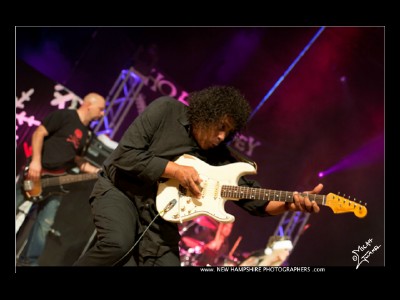
MG/NHP: (via email) Tell us about the song, Red House.
Jon: I resisted for years, playing Hendrix songs, because in the early days of my recording career I was compared to Jimi Hendrix more than was comfortable for me, you know, so I strayed away from it. In recent times, (you say) I'll just play this one, of course, it turned out to be one that people enjoyed seeing me perform, I haven't been doing it that long, but I had resisted Jimi Hendrix songs for years, that is one that sort of insisted that it be performed. So short story and there it is.
Charlie: And people say, wow, he's just trying to be Hendrix, look at him, he's playing a Strat, meanwhile, a Stratocaster is the single most popular guitar in the world, everybody plays a Strat.
... you know... he holds his guitar ... look at him ... (both laugh).
Jon: That's why I enjoy doing the song, people seem to enjoy it. It was sort of a surrender to the powers that be [saying] it must be played.
Visions of Music through the Crazy Moon and Stories of The Legendary Ahmet Ertegun
Bluebirdreviews: Fantastic - Can you play a few bars of CRAZY MOON for me, because I love that song.
Charlie: CRAZY MOON ... I wish I had my guitar ... (sings). Why are you laughing at me, putting on heirs with me, you're making me feel terrific, be specific, crazy moon, making me fall in love.
Jon and Bluebirdreviews: (snapping along) ...
Jon: uh-huh.
Bluebirdreviews: love it !
Charlie: I signed a deal one time, with Ahmet Ertegun with Atlantic Records. He loved that song, as well as Impossible World, Fool in Love and all those jazzy songs. And I was on that label for a year and he said, I love this stuff, you've got to record it just like this - just guitar a little drums, but we'll never get it on the radio - and I said ok. I was just coming out of the Joe Perry project, we started Farrenheit and he let me go to do that on Warner Brothers. But that (Crazy Moon) was one of his favorite songs.
Jon: When it was meaningful to get a song on the radio.
Charlie: That was when Laura Branigan was big. She was on with Ertegun. So that's my story about Crazy Moon.
Bluebirdreviews: It is a great life, this life of music, Ertegun said.
Charlie: Yeah, he was something else, that guy.
Bluebirdreviews: I went to his tribute in London. I also went to the 40th Anniversary of Atlantic Records in NYC, Madison Square Garden. [Years later] I managed to get tickets to the tribute to him at the O2 in London. It was amazing, not only Zeppelin, the whole of it, the tribute to him, who he was ...
Jon: Amazing ...
Charlie: We sent our tape in to his nephew, Aziz Gocksel, [who was the A & R rep that brought my band BALLOON into Atlantic, shortly before I left BALLOON to join the Joe Perry Project.] Aziz was playing the tape of Crazy Moon at Atlantic and they told me that Ahmet walked by his office at Atlantic in NY. Who is that artist? Ahmet said, Charlie Farren. He [Aziz] said, Are you working with this artist ? Ahmet asked. He [Aziz] said, Yes. [Ahmet replied, ] I want that, I want you to give me that, I want that to be my project! He called up the guy who was working with me. I'm coming to Boston I want to see where you work and I want to talk about your music. He came to my apartment. He came to my apartment, he had an apartment in the Back Bay and he sat in my studio in a little room about twice the size of this and we hung out for about three or four hours, just listening to records and talking about music. And he did that twice.
Jon: wow ... that must have been something ..
Bluebirdreviews: It's historic, just to hear it, I get chills.
Charlie: I tell you at the time, I was not that aware of ...
Jon: ... his legacy ...
Charlie: He was the president of a label .. but I didn't understand .. the full meaning of ...
Jon: the full meaning of... his legacy ...
Charlie: of his legacy ... and he would bring records to listen to and I would have records to listen to and talk about producers ... in the hit league, he would fly and he would have his chauffeur drive, so he would have a driver around Boston. And he came down two or three times and twice hung with me in my apartment.
Jon: That's wild, isn't that wild ?
Bluebirdreviews: Well, he always seemed to be down to Earth, what I've read about him and watching him in footage, and he started this company on his own. Didn't he borrow money to start his record label. He borrowed 12 thousand dollars to start it on his own.
Charlie: Yeah, and the first records on his label - he wrote. So he wanted to come and see the studio, I had a one inch 8 track and a board and he wanted to see the workshop, he wanted to see how I worked and just understand who is this guy ... because I like what I hear, but I need to know that he's doing it, I need to know that he's creating it ... I thought that was a trip ...
Jon: get a sense of you ...
Jon: Now you look back and you realize ...
Charlie: all I wanted to do was get a record out and go on tour ... and he was like, dude, just wait ... because ... and I'm was coming out of the Joe Perry project ...
Jon: there's no waiting ...
Charlie: there's no waiting in my mind... so I said, you know what, in all due respect, if I can get out of this deal, then I can get a rock deal ... and he said, you know what, I hate it, but ok, he let me out of the deal ... just like that, let me go and then we signed in six months with Warner Brothers.
Jon: You would have had to be willing to be on Ertegun time ... whatever that was ... He was going to put the record out when the time was right ... Ertegun Time.
Bluebirdreviews: His vision.
Jon: His vision.
Charlie: His vision.
Charlie: And at the time, I couldn't afford to wait, like another year ... I was on the label for a year ... and he was like, this is way too busy ...
Jon: He's not in a hurry
Charlie: I had to pay my rent.
Jon: Ahmet Ertegun can take the long view
Charlie: The real story was - I was itching to just get out and back on the road and rock
Jon: Sure
Bluebirdreviews: That's what drives you
Charlie: This kind of wait and write ... didn't make sense to me as a younger guy, but we got Farrenheit together and it was a blast ... so that's a longer answer ...
Bluebirdreviews: I love it. I love it !
What Do You Want the Next Generation to "Get" About Music?
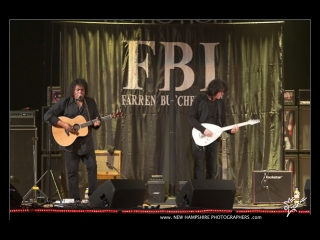
Bluebirdreviews: So this is a question that I'm going to ask everyone I interview: What is it that you want the next generation to 'get' about music ?
Charlie: I would say ... I like all kinds of music, we were talking about this earlier, I like rap music, I like good music and there's good music in every genre. I don't really like genres, I just like good music. I would hate to see kids lose the ability to play real instruments. I think electronic music, it can be great, but I think it's important to have a critical mass of the young people be able to play guitar or piano or drums that you hit and they resonate ... real flutes or horns
Jon: ... or piano - something that's real.
Charlie: Real. So much music, of what you hear today on the radio is electronic. It's a computer.
Jon: Meaning it's computer based.
Charlie: And that's not itself a bad thing, but if it becomes the only thing, I think that kids would lose richness. But I hope that live music keeps being live ...
Jon: I agree with Charlie. It's the only thing that I lamented. When hip hop became a force, and I could see the handwriting on the wall.
Bluebirdreviews: Sylvia Robinson just died, I wrote an article on her, The Sugar Hill Gang.
Jon: I know ... when that first became a force ... what worried me was that what would be lost is that connection between music and artists to musical instruments. That sampling and using phrases from other records would be the only media. I'm glad to see that hasn't happened.
Charlie: Well, what has happened, is that the music you hear on the radio is electronic. It's generated by computers and most of these pop artists go out on the road and pretend that they are playing, but they are just playing tracks.
Jon: It happens a lot. More than you can imagine.
Charlie: Computerized tracks. And many of the times, they are not even singing, they are singing into microphones, but what comes out of the PA system is a pre-recorded track.
Jon: It is the pre-recorded track, it happens more often [thank you think.].
Jon: Remember that was a big deal with Milli Vanilli ?
Bluebirdreviews: Yeah, people were upset !
Jon: Remember that ? Woo yeah, what a revelation that was ... that happens every day all day on more tours than you'd ever imagine.
Charlie: The big pop tours ... not all of them but a lot of them.
Jon: Many of them ...
Charlie: That's why, you know, Taylor Swift I think is really talented. And she plays guitar and sings and writes her own songs and I thought that was encouraging... you know, to me people really playing and creating music ... it's really important ...
Jon: To me, to the younger generation, we both hope, that the connection to musical instruments, doesn't ever go away, because I think there is something fundamental and required about that in order to claim the title, maybe I'm old fashioned but that's what I think.
Jon: We're looking forward to playing with Robert Cray, we're both fans. This is a wonderful venue and we're so happy to have met you and that you were able to come by ...
Charlie: Bright dressing rooms, dry floors !
Jon: All good things!
Jon: Thanks very much for taking the time out to see us.
Bluebirdreviews: Yes, thanks very much, thank you for your time, it's been an honor, absolutely !!!

Deja Blue and Heaven On A Railroad Line
Off camera, I spoke with Jon and Charlie for a little while longer about music. Some of their favorite artists, or music they were just listening to at the time, were everything from Miles Davis to Eminem, Leon Russell to Taylor Swift. Jon said something prolific, but also very simple, which was a concept I'd been following for a while, but never really articulated. He said, 'You should always listen to a genre of music that is opposite of what you are used to." To know and understand the vast array of sounds and potential talent in the music world requires some adventure on the part of the listener and musician. Charlie again noted that he doesn't like set styles of music, but 'good music' that brings the quality and intense talent of the artist to the forefront. This gave me a newly inspired foundation to keep exploring the music that is current and integrating it into historical pieces.
I stayed for their set and it totally rocked. They played seven songs and told stories about each one in the transition. From the deep blues based Mule Driver to the soulful, brooding Fool In Love and the rockin ending with the classic, I Hear You Knockin, this team engaged the crowd not only with their music, but with the free spirited way that they approach life in general. Real musicians with a genuine connection to audiences and the artistic world, their music and media work will continue to have great impact.
